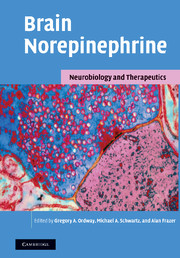Book contents
- Frontmatter
- Contents
- List of contributors
- Acknowledgements
- Introduction: revision of an old transmitter
- Part I The neurobiology of norepinephrine
- Part II Norepinephrine and behavior
- 6 Role of the locus coeruleus-norepinephrine system in arousal and circadian regulation of the sleep–wake cycle
- 7 The locus coeruleus and regulation of behavioral flexibility and attention: clinical implications
- 8 Norepinephrine and long-term memory function
- 9 Norepinephrine and stress
- Part III The biology of norepinephrine in CNS pathology
- Part IV Psychopharmacology of norepinephrine
- Index
8 - Norepinephrine and long-term memory function
from Part II - Norepinephrine and behavior
Published online by Cambridge University Press: 07 September 2009
- Frontmatter
- Contents
- List of contributors
- Acknowledgements
- Introduction: revision of an old transmitter
- Part I The neurobiology of norepinephrine
- Part II Norepinephrine and behavior
- 6 Role of the locus coeruleus-norepinephrine system in arousal and circadian regulation of the sleep–wake cycle
- 7 The locus coeruleus and regulation of behavioral flexibility and attention: clinical implications
- 8 Norepinephrine and long-term memory function
- 9 Norepinephrine and stress
- Part III The biology of norepinephrine in CNS pathology
- Part IV Psychopharmacology of norepinephrine
- Index
Summary
Introduction
This chapter reviews research investigating the role of norepinephrine in modulating the consolidation of long-term memory. The focus is primarily on noradrenergic activation-influenced storage of lasting explicit (episodic/declarative) memory. The hypothesis that norepinephrine plays a role in learning and memory emerged more than three decades ago when Kety suggested that adrenergic catecholamines released by certain emotional states may serve “to reinforce and consolidate new and significant sensory patterns in the neocortex.” The initial experiments investigating this general hypothesis examined the effects of a large variety of sympathomimetics or antiadrenergic agents on learning and memory. Systemic injections of amphetamine were found to facilitate memory and, in contrast, depletion of norepinephrine by tyrosine hydroxylase inhibition with α-methyl-p-tyrosine (α-MPT), by 6-hydroxydopamine or by dopamine-β-hydroxylase inhibition with diethyldithiocarbamate (DDC) usually impaired learning performance. Similar impairing effects were obtained with systemic injections of the noradrenergic toxin N-(2-chloroethyl)-N-ethyl-2-bromobenzylamine (DSP-4) or disruption of vesicular storage of catecholamines with reserpine. Although the use of these nonspecific antiadrenergic agents clearly implicated norepinephrine in learning and memory, it remained unclear whether the effects involved peripheral or central mechanisms.
The findings of Gold and van Buskirk were among the first to suggest the involvement of central norepinephrine in memory. They showed that inhibitory avoidance training decreased brain norepinephrine levels under conditions that resulted in good retention, suggesting an enhanced release and metabolism of this neuromodulator during training.
- Type
- Chapter
- Information
- Brain NorepinephrineNeurobiology and Therapeutics, pp. 236 - 274Publisher: Cambridge University PressPrint publication year: 2007



